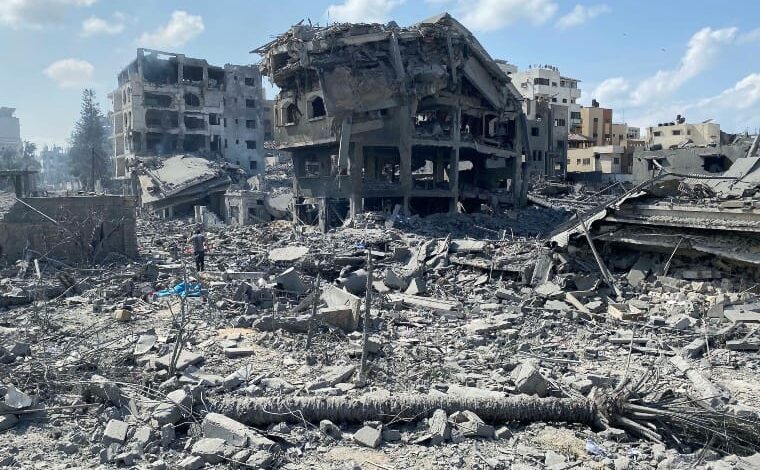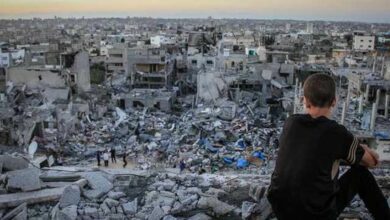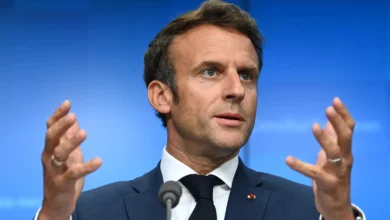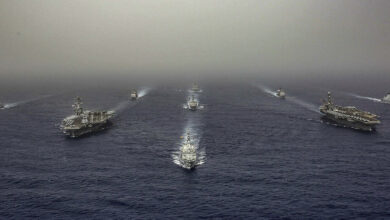It’s too late! A Souhern Mediterranean Perspective

It seems the unconditional support to Israel by some of its Western allies is becoming conditional. With a vote of 204 to 117, Canada’s Parliament has moved to end arms exports to Israel, demand a cease-fire, and push for the establishment of a Palestinian state through a negotiated two-state solution despite pressure from pro-Israel lobbies.
Israel’s Ynetnews reports that this decision has raised concerns in Israel regarding a potential “domino effect” among other nations, as in the case of the Netherlands who has delayed F-35 fighter jet parts delivery to Israel.
The real fear in Israel is that Britain will also stop supplying the IDF with weapons and ammunition after a request made by the British Foreign Minister to allow international organizations, including the International Red Cross, to visit the detainees from Gaza who have been arrested and continue to be detained by the IDF since October 7th.
It’s important to recognize that alleging that Canada’s recent parliamentary vote signals a broader global shift and “reevaluation” of support to Israel is where analysts can trip up. This shift did not come as a realization by Israel’s allies that their “most democratic” ally in the Middle East has gone too far. It came as response to popular pressure and changing demographics and mentalities.
This discontinuity reading of the approach by Israel’s Western allies to the Palestinian plight is fallacious also because pressure on Israel by these allies to end the genocide of Gazans has been timid. Canada does not actually supply the Israeli army with weapons and the end of Canadian arms export is merely symbolic.
The other reason for qualifying the “humanitarian” reading of the emerging conditionality among some Western states regarding the extension of their support to Israel as fallacious is its belatedness. “Better late than never” sometimes does not go beyond idiomaticity. “Late” is sometimes the equivalent of “never.” For almost 6 months, Israel, aided by the complaisance of its allies, has managed to convert what was once unthinkable into a new normal.
Now, after 5 months and 2 weeks of warfare, everything that should shake the most assured of the “progressive” minds has been committed by the government of Netanyahu as the international community succumbed to a double-standardized lethargy.
Benjamin Netanyahu has insisted on a ground invasion of Rafah where 1.5 million humans are crammed together in what is the most densely populated city in the world today as if the tens of thousands of dead children have not been enough to send his vindictiveness into rest.
The death toll under the Israeli bombardment of Gaza has exceeded 30000, most of whom have been women and children. The 2024 winter breathed death and disease into the silence and darkness of porous rag-tag tents, secretly taking away little fragile bodies before bombs would wake them up again to the reality of this unjust world.
With no access to fuel, medicine, or food, the Gazan hospitals are powerless before this crisis. Several children died in Kamal Adwan hospital due to malnutrition, dehydration, and lack of medicine. Meanwhile, Al Shifa hospital is under siege.
Famine in Gaza is not theory. It has been upgraded from a concern to a dire reality. Chaotic scenes of hungry people trying to grab as much aid dropped by air jets as they could announce a deeper crisis elsewhere on this planet. Weaponization of food is war crime. Killing people in the Floor Massacre upgrades war criminality to an unprecedented level.
All this has taken place for almost half a year in front of digital screens that left no room for doubting the authenticity of the bloodshed since the early days of its unleash. The normalization of bloodshed has lasted long enough today to engender further bloodshed in different parts of the planet in the future and it is too late to avert this dark scenario. In a world that prides itself on its connectivity, none will be immune. Starvation of civilians can replicated anywhere on this planet one day as a war method. International food security is already under threat. Anyone who will replicate Israel’s war tactics will have a made-in-Israel argument: why didn’t you say this to the Israelis?
More failures in the Global South:
At a time when the political West (which comprises most of Israel’s allies) likes to see the growing Chinese, Russian, and Indian influence in the Global South as a War waged by these powers on its interests, its conduct in Gaza breaks down this victimhood narrative and shows that Western waning influence in the region could be the result of Western short-sightedness .
If several events over the last few years such as the 2008 financial crisis weakened the West’s hard power, the Gaza War has seriously damaged the West’s soft power grounded on the principles of democracy and human rights.
Latin American governments condemned Israel long ago, thus coming in the way between the West and its moral claim of exclusive monopoly over the genesis of liberal values and defence of international law and security.
Latin American support for the Palestinians is seen in the Arab World as part of Third-World/ Global South solidarity in the face of biased Northern interventionism and interests. Even the most liberal minds I spoke to in this part of the globe are finding it hard to stomach Wetsren liberalism and secularism mixed with a flavour of complaisance towards Netanyahu’s religious and racial rhetoric since the outbreak of the war.
After all, there is no place on this place on Planet Earth that prides itself on going beyond race and difference than Western Europe and North America. With Israel claiming it is an extension of the Political and Cultural West into West Asia, and Netanyahu constantly dividing the world into “light” and “darkness,” sometimes in the presence of Western leaders, Israel’s allies are embarrassed, say burdened, by a racial counter-argument to their diversity narrative in Gaza.
Just like in free-market, in an international politics and relations within the framework of free trade, trust plays a significant role in bilateral and multilateral transactions. Only a radical arms embargo today can restore confidence in the international community’s capacity for averting war. For Israel’s Western allies, only pressure on Netanyahu to end his war on the Palestinians and to accept a two-state solution can turn “late” into a “better than never.”
Nour I.B. Latrech




